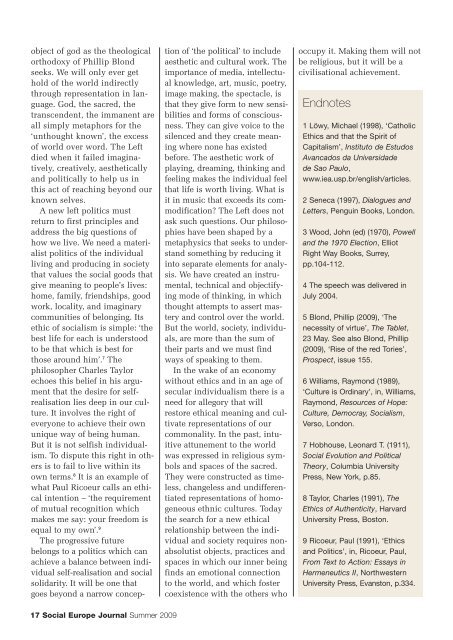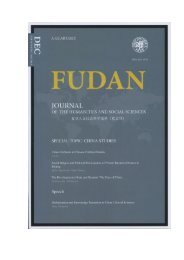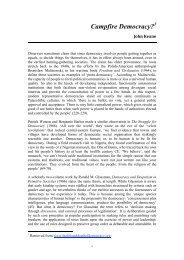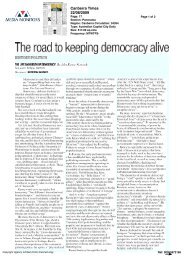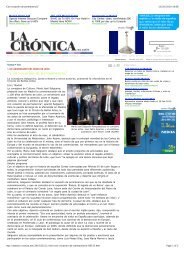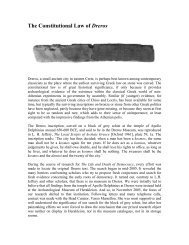The Ethics of Capitalism - Social Europe Journal
The Ethics of Capitalism - Social Europe Journal
The Ethics of Capitalism - Social Europe Journal
You also want an ePaper? Increase the reach of your titles
YUMPU automatically turns print PDFs into web optimized ePapers that Google loves.
object <strong>of</strong> god as the theological<br />
orthodoxy <strong>of</strong> Phillip Blond<br />
seeks. We will only ever get<br />
hold <strong>of</strong> the world indirectly<br />
through representation in language.<br />
God, the sacred, the<br />
transcendent, the immanent are<br />
all simply metaphors for the<br />
‘unthought known’, the excess<br />
<strong>of</strong> world over word. <strong>The</strong> Left<br />
died when it failed imaginatively,<br />
creatively, aesthetically<br />
and politically to help us in<br />
this act <strong>of</strong> reaching beyond our<br />
known selves.<br />
A new left politics must<br />
return to first principles and<br />
address the big questions <strong>of</strong><br />
how we live. We need a materialist<br />
politics <strong>of</strong> the individual<br />
living and producing in society<br />
that values the social goods that<br />
give meaning to people’s lives:<br />
home, family, friendships, good<br />
work, locality, and imaginary<br />
communities <strong>of</strong> belonging. Its<br />
ethic <strong>of</strong> socialism is simple: ‘the<br />
best life for each is understood<br />
to be that which is best for<br />
those around him’. 7 <strong>The</strong><br />
philosopher Charles Taylor<br />
echoes this belief in his argument<br />
that the desire for selfrealisation<br />
lies deep in our culture.<br />
It involves the right <strong>of</strong><br />
everyone to achieve their own<br />
unique way <strong>of</strong> being human.<br />
But it is not selfish individualism.<br />
To dispute this right in others<br />
is to fail to live within its<br />
own terms. 8 It is an example <strong>of</strong><br />
what Paul Ricoeur calls an ethical<br />
intention – ‘the requirement<br />
<strong>of</strong> mutual recognition which<br />
makes me say: your freedom is<br />
equal to my own’. 9<br />
<strong>The</strong> progressive future<br />
belongs to a politics which can<br />
achieve a balance between individual<br />
self-realisation and social<br />
solidarity. It will be one that<br />
goes beyond a narrow concep-<br />
tion <strong>of</strong> ‘the political’ to include<br />
aesthetic and cultural work. <strong>The</strong><br />
importance <strong>of</strong> media, intellectual<br />
knowledge, art, music, poetry,<br />
image making, the spectacle, is<br />
that they give form to new sensibilities<br />
and forms <strong>of</strong> consciousness.<br />
<strong>The</strong>y can give voice to the<br />
silenced and they create meaning<br />
where none has existed<br />
before. <strong>The</strong> aesthetic work <strong>of</strong><br />
playing, dreaming, thinking and<br />
feeling makes the individual feel<br />
that life is worth living. What is<br />
it in music that exceeds its commodification<br />
<strong>The</strong> Left does not<br />
ask such questions. Our philosophies<br />
have been shaped by a<br />
metaphysics that seeks to understand<br />
something by reducing it<br />
into separate elements for analysis.<br />
We have created an instrumental,<br />
technical and objectifying<br />
mode <strong>of</strong> thinking, in which<br />
thought attempts to assert mastery<br />
and control over the world.<br />
But the world, society, individuals,<br />
are more than the sum <strong>of</strong><br />
their parts and we must find<br />
ways <strong>of</strong> speaking to them.<br />
In the wake <strong>of</strong> an economy<br />
without ethics and in an age <strong>of</strong><br />
secular individualism there is a<br />
need for allegory that will<br />
restore ethical meaning and cultivate<br />
representations <strong>of</strong> our<br />
commonality. In the past, intuitive<br />
attunement to the world<br />
was expressed in religious symbols<br />
and spaces <strong>of</strong> the sacred.<br />
<strong>The</strong>y were constructed as timeless,<br />
changeless and undifferentiated<br />
representations <strong>of</strong> homogeneous<br />
ethnic cultures. Today<br />
the search for a new ethical<br />
relationship between the individual<br />
and society requires nonabsolutist<br />
objects, practices and<br />
spaces in which our inner being<br />
finds an emotional connection<br />
to the world, and which foster<br />
coexistence with the others who<br />
occupy it. Making them will not<br />
be religious, but it will be a<br />
civilisational achievement.<br />
Endnotes<br />
1 Löwy, Michael (1998), ‘Catholic<br />
<strong>Ethics</strong> and that the Spirit <strong>of</strong><br />
<strong>Capitalism</strong>’, Instituto de Estudos<br />
Avancados da Universidade<br />
de Sao Paulo,<br />
www.iea.usp.br/english/articles.<br />
2 Seneca (1997), Dialogues and<br />
Letters, Penguin Books, London.<br />
3 Wood, John (ed) (1970), Powell<br />
and the 1970 Election, Elliot<br />
Right Way Books, Surrey,<br />
pp.104-112.<br />
4 <strong>The</strong> speech was delivered in<br />
July 2004.<br />
5 Blond, Phillip (2009), ‘<strong>The</strong><br />
necessity <strong>of</strong> virtue’, <strong>The</strong> Tablet,<br />
23 May. See also Blond, Phillip<br />
(2009), ‘Rise <strong>of</strong> the red Tories’,<br />
Prospect, issue 155.<br />
6 Williams, Raymond (1989),<br />
‘Culture is Ordinary’, in, Williams,<br />
Raymond, Resources <strong>of</strong> Hope:<br />
Culture, Democray, <strong>Social</strong>ism,<br />
Verso, London.<br />
7 Hobhouse, Leonard T. (1911),<br />
<strong>Social</strong> Evolution and Political<br />
<strong>The</strong>ory, Columbia University<br />
Press, New York, p.85.<br />
8 Taylor, Charles (1991), <strong>The</strong><br />
<strong>Ethics</strong> <strong>of</strong> Authenticity, Harvard<br />
University Press, Boston.<br />
9 Ricoeur, Paul (1991), ‘<strong>Ethics</strong><br />
and Politics’, in, Ricoeur, Paul,<br />
From Text to Action: Essays in<br />
Hermeneutics II, Northwestern<br />
University Press, Evanston, p.334.<br />
17 <strong>Social</strong> <strong>Europe</strong> <strong>Journal</strong> Summer 2009


